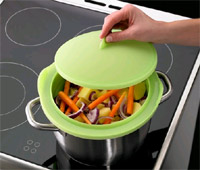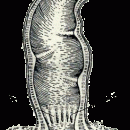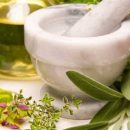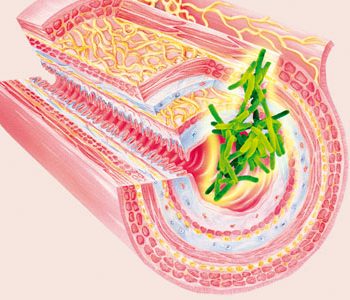Crohn disease severe diseases of the gastrointestinal tract. Tactics of treatment depends on the severity of the disease. In this case, the right medical nutrition is of great importance.
Content

The character of the diet in the Crohn disease depends on the localization and length of the intestinal lesion, the phases of the disease, as well as the tolerance of patients with certain foods.
During the period of exacerbation, fractional food is prescribed 5-6 times a day. The protein content in the diet, especially with a persistent diarrhea, should be increased to 1.3-2 g / kg per day.
In the aggravation phase, the diet must be mechanically and chemically sparing with an increased protein content, vitamins, the exception of milk with its intolerance and limited amount of coarse plant fiber, especially when the sections of the intestine. These conditions correspond to diet No. 4, then No. 4 B.
With an extensive destruction of the small intestine in the period of exacerbation, enteral elementary balanced monodins containing hydrolyzed proteins, fats, carbohydrates with the exception of lactose and fiber. With a significant exhaustion of patients, persistent diarrhea, parenteral nutrition is shown, it is necessary in the treatment of such intestinal lesions, like fistula, obstructive processes, a short intestine syndrome, as well as in the preparation of patients with a body mass deficit and metabolic disorders.
The purpose of therapeutic nutrition
The main purpose of therapeutic nutrition is mechanical, chemical and thermal spurs of the intestine. Therapeutic food has a positive effect on the main pathogenetic factors of chronic enteritis and diarrhea.
With a sharp exacerbation of the disease, pronounced diarrhea, 1-2 so-called «hungry» day. IN «Hungry» Days should be taken about 1.5-2 l liquid per day in the form:
-
strong, hot, not very sweet tea with lemon 5-6 times 1/2 cup with 1-2 crackers;
-
divorced boiled water of the juice of black currant, blueberry juice, ragger rosehip.
Instead of «hungry» Days can be used under the control of individual tolerance:
-
Acidophilic day - 1.5 l asidophilic milk per day;
-
Kefirday – one.5 l kefir of three days ago per day;
-
Apple day – one.5 kg of apples peeled from the peel passed through a meat grinder or finely rubbed and taken in the form of a homogeneous mass of equal portions during the day (the rubbed apples have antiharya effect due to the content of large amounts of pectin);
-
carrot day – During the day, equal portions take 1.5 kg of carrots prepared in the same way like apples (carrots possesses contradary and adsorbing action).
After 1-2 «hungry» Days go to Table No. 4 and its options (46, 4V). These diets provide sufficient administration to the body of all necessary foods necessary for normal life, primarily proteins, vitamins, electrolytes; Good assimilation of food thanks to an adequate set of products and appropriate culinary processing (food is prepared in a boiled form or a pair, is given in the witch form).
Diet 4
Indications for appointment: acute and chronic bowel diseases during profuse diarins and sharply expressed dyspeptic phenomena. This version of the diet is prescribed in chronic enteritis during the exacerbation period in the presence of profuse diarins and sharply expressed dyspeptic phenomena. Diet 4 can be prescribed after 1-2 «hungry» days or immediately in the period of exacerbation.
general characteristics
Diet with a limitation of fats and carbohydrates and normal protein content, with a sharp limitation of mechanical and chemical irritants of the mucous membrane and gastrointestinal receptors, with the exception of products and dishes that enhance fermentation and rotting processes in the intestine, as well as strong bile stimulants, stomach secretions and pancreas, substances annoying liver.
Culinary treatment: All dishes are prepared in a boiled form or a couple, wipe.
The energy value
Composition: proteins - 100 g, fats - 70 g, carbohydrates - 250 g, salt - 8-10 g, energy value - 2100 kcal. Number of free fluid - 1.5-2 L.
Diet: fractional (5-6 times in time).
Food temperature: Hot dishes - 57-62 °C, cold - not lower than 15 °WITH.
List of recommended dishes:
Bread and bakery products: White bread crags, thinly chopped and unsubstituted;
Soups: with the addition of mucous membranes, steam or water-cooked meat or fish fabrics, fritelines, boiled wipe meat;
Meat and fish dishes: Steam meat and fish cutlets, fridge, meat souffle, non-fat meat (beef, rabbit), meat minced meat, passing meat 3-4 times through a meat grid with a shallow grid;
Dishes and side dishes: Water porridges on water or low-fat meat broth - rice, oatmeal, buckwheat, manna; All legumes and pasta are excluded;
Dishes from eggs: Eggs not more than 1 per day only in dishes, with good tolerability, the eggs are allowed or in the form of steam omelettes (no more than 2 eggs per day);
Sweet dishes, fruits, berries: Sugar in limited quantity (up to 40 g per day), Kisli, Jelly from blueberries, cherry, ripe pears, other berries and fruits rich in tanning substances:
dairy: Freshly prepared cottage cheese and in the form of suflates, all other dairy products are not allowed;
the drinks: tea, black coffee, cocoa on the water, risks of rosehip, blueberries;
Fats: Creamy butter (add to finished dishes by 5 g per serving). Sauces, spices, snacks, alcohol are prohibited. After 4-5 days the patient is prescribed diet No. 4 b.
Special purpose: Provide full-fledged meals in a moderately pronounced inflammatory process of the gastrointestinal tract, to reduce the inflammatory process in the intestine, normalization of its functional state.
General characteristics: The diet is physiologically complete with a normal content of proteins, fats, carbohydrates, restricting the table salt to the lower boundary of the norm (8-10 g), with a moderate limitation of mechanical and chemical irritants of the gastrointestinal tract, the exception of products that enhance the fermentation and rotting processes in intestine, as well as strong bile stimulants, stomach secretion, pancreas.
Culinary processing: All dishes are prepared in a boiled form or a couple, wipe.
Energy value and composition:
proteins - 100-120 g (according to. L. Greesheva, - up to 135 g), Fats - 100-120 g, Salt - 8-10 g, Energy value - 3000-3500 kcal. Number of free fluid - 1.5 L. The diet includes an increased amount of vitamins, trace elements, calcium, phosphorus, iron, lipotropic substances. Power Mode: Fractional (5-6 times a day).
List of recommended dishes:
Bread and bakery products: Bread wheat yesterday, dry biscuit, dry cookies, 1-2 times a week, non-propelled buns, pies with apples, jam, cheesecakes with cottage cheese;
Soups: on a degreasing meat broth with well-strained croups, vermicellus, meatballs, finely chopped vegetables (potatoes, carrots, cauliflower, pumpkin);
Meat and fish dishes: Meat low-fat (beef, veal, chicken, turkey, rabbit), gentle varieties in the form of a whole piece, beef chopped (cutlets, frkin, beds, souffle, rolls boiled or steam), low-fat fish (pike perch, bream, cod, perch, hede ) in the form of a piece or chopped (boiled or steam);
Dishes and garnish of vegetables: Potatoes, zucchini, pumpkin, carrots, cauliflower, green peas (with good tolerability) in boiled and witch form, steam vegetables soufflies; ripe tomatoes no more than 100 g per day (with good tolerability); Cabbage white-baked, beets, radishes, turnip, sorrel, spinach, onions, garlic, mushrooms;
Dishes and side dishes, legumes, pasta: Various porridges (except wheat and pearl) on water with the addition of ultrasound of milk or cream of 10% fat, steam puddings from the rubbed porridge, boiled vermichel;
Dishes from eggs: whole eggs (no more than 1 per day) in dishes; Dishes from egg proteins: steam omelets; scrambled eggs;
Sweet dishes, fruits, berries: Kissels and rubbed compotes, jelly, mousse, souffle of sweet berries and fruits (except melons, apricots, plums), baked apples, pears, marmalade, marshmallow, grazing, jam and jams from sweet berries and fruits; With good tolerability of 100 g on the day of sweet berries in the raw form (strawberries, strawberries, raspberries, peeled ripe apples, but rubbed); Apple juices, cherry, crimson, strawberry, mandarine, orange in half with water; Sauces, spices: Bay leaf, dill, parsley, cinnamon, dairy sauce, fruit sauces;
Snacks: Flower fish and veal, black caviar;
the drinks: Broth of rosehip, tea with milk, 10% cream, coffee with milk and black coffee (faded);
Fats: Creamy butter added to finished dishes and give in natural form with bread not more than 5-15 g per reception.
dairy: Milk Freshly only in dishes in small quantities, kefir, acidophilic milk, ryazhenka; Russian cheese, Yaroslavsky; Sour cream nice in limited quantities as seasoning; Cottage cheese fresh in the form of pudding, casserole, cottage cheese;
Diet No. 4 B is appointed by 4-6 weeks until the normalization of the chair, the elimination of the exacerbation of chronic enteritis. Then the patient recommends diet number 4 in.
Diet number 4 in Culinary processing: All dishes are prepared in a boiled form or for a couple, and also baked in the oven, food is provided mainly in a non-scratched form.
Diet: preferably fractional (5-6 times a day, but not less than 4 times).
Food temperature: Soups: on a weak low-fat or fish broth with various croups (except for millet), vermicelline, vegetables (potatoes, carrots, zucchini, pumpkin, cauliflower), with good tolerability, white cabbage, green peas, young beans, beets are allowed; Dishes from eggs: solid eggs (1 per day) in dishes, steam omelets, with good tolerability of eggs sick (no more than 2 per day);
sweet dishes, Fruits, berries: Kissels, compotes, jelly, mousse, souffle of sweet berries and fruits (except apricot, drain, melons), baked apples, pears, marmalade, marshmallow, grazing, iris, jams and jams from sweet berries and fruits, in cheese Sweet varieties berries (strawberry, strawberries, raspberries), ripe soft apples and pears peeled (100-200 g per day), with good tolerability of tangerines and oranges, watermelons, grapes, juices from sweet berries and fruits (apple, strawberry, cherry, mandarine and Dr.); Sauces and spices: bay leaf, dill, parsley, cinnamon, carnation, milk sauce, fruit sauces;
Snacks: Flower fish, veal, doctorate sausage, black caviar, waste herring, low-fat ham;
the drinks: Broth of rosehip, faint coffee and tea;
Fats: Butter creamy in dishes and in natural form with bread not more than 5-15 g per reception depending on tolerability.
General characteristics: The diet is physiologically full with a normal content of proteins, fats, carbohydrates, with some restriction of mechanical and chemical stimuli of the gastrointestinal mucosa and receptors, with the exception of products and dishes that enhance the processes of fermentation and rotting in the intestine, as well as strong bone stimulants, stomach secretion and pancreas.
List of recommended dishes:
Bread, bakery: Wheat bread, yesterday, dry biscuit, dry cookies, 1-2 times a week buns, pies with jam, meat, apples, jam, jam, cheese cheesecakes;
Meat and fish dishes: Meat is low-fat (beef, veal, chicken, turkey) in the form of a whole piece, meat, meat, steam or boiled meal; non-fat fish boiled;
 Dishes and garnish of vegetables: Potatoes, zucchini, carrots, pumpkin, cauliflower boiled or steam unzpoles and in the form of mashed potatoes, vegetable casseroles, with good tolerability - green peas, white cabbage, beans, ripe tomatoes (100-120 g per day); excludes turnip, radish, radishes, sorrel, spinach, onions, garlic, mushrooms;
Dishes and garnish of vegetables: Potatoes, zucchini, carrots, pumpkin, cauliflower boiled or steam unzpoles and in the form of mashed potatoes, vegetable casseroles, with good tolerability - green peas, white cabbage, beans, ripe tomatoes (100-120 g per day); excludes turnip, radish, radishes, sorrel, spinach, onions, garlic, mushrooms;
Switches from croup, legume pasta: various crumbly porridges (except for millet and pearl) on water with the addition of 1/3 of the milk part, steam and baked puddings, boiled vermichel;
dairy: Fresh milk in dishes, with good tolerability - in its pure form; kefir, acidophilic milk, ryazhenka, prokubvash; Cheese unshearch (Russian, Yaroslavsky), fresh cottage cheese;
In therapeutic nutrition, the patient with chronic enteritis is widely used nutrient mixtures recommended for baby food (for example, «Baby» and etc.), as well as protein entit of the institution of therapeutic nutrition.









